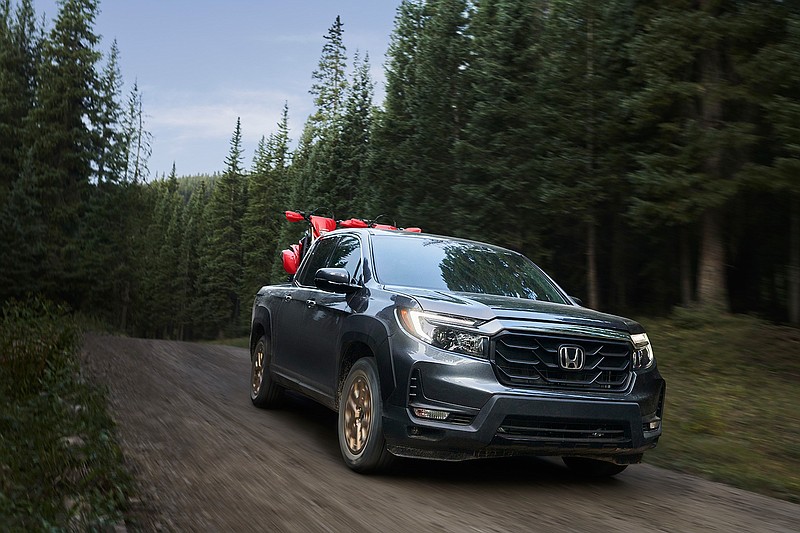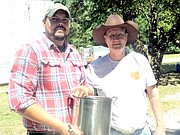DALLAS - A pronounced hood power bulge and a prominent skid plate under a squared-off nose all help to give the 2021 Honda Ridgeline a much more trucky look that Honda hopes will help its midsize pickup accelerate a surge in sales.
In East Texas, where trucks earn their keep out in the pasture or on the weekends, the chief knock on the Ridgeline is it is too pricey and that it is not a truck. It does not have two steel beams with a body bolted on top, so it cannot do as much work nor is it as safe.
Unpacking those objections, we find they range from true to false to it all depends.
The Ridgeline is guilty as charged of being of unibody - car-like - construction. That means if you plan to go rock-crawling, or frequently haul hay bales into muddy, midwinter pastures, this is not your truck. That is fine with Honda, which targets the Ridgeline at upscale buyers looking for a family hauler that is great for soccer practice, shopping, and occasional weekend chores.
Driving an entry-level Ridgeline Sport around North Dallas this week, we noticed the cabin has more front seat shoulder and hip space than nearly all full-size pickups. There is enough rear legroom to comfortably carry three more adults. Seats are ample, the ride is smooth, and road noise is well damped.
Our tester was as not well-appointed as a Ram pickup but is on par with other competitors. We noted the Sport had an abundance of cheap plastics and uneven interior fit and finish, so Honda is not above doing what every other pickup manufacturer does, larding in profit.
On the other hand, the silky, 280 hp, 3.5-L VTEC V6 backed by a smooth and responsive 9-speed automatic reminded us why Honda and Accura this year has seen a doubling of light-duty SUV and truck sales. Though Honda continues to sell a passle of Accords and Civics, cars account for roughly 36% of sales.
Ridgeliine sales are dwarfed by those of the Big Three, but it is outselling it closing competitor, the upscale GMC Canyon 2:1.
Honda has learned how to build great trucks, the Honda way.
Capable, midsize pickup
The Ridgeline gets mixed grades on towing and hauling capacities. It can tow 5,000 lbs., which is significantly less than the 7,500-lb. or so capacity of competitors. To put those numbers in perspective, an average ATV trailer weighs from 600 to 1,500 lbs.
Right now, Blonde Bride and I have our eyes on a nifty, family-sized, pop-up camping trailer than weighs less than 900 lbs., so although towing capacity is played up in marketing messages, it is more about what you plan to dio.
Advantage: Other guys
In the bed, the Ridgeline can haul nearly 1,600 lbs., among the best in class, and is the only midsize pickup with a bed wide enough to lay flat a sheet of plywood. The rear third of the bed opens into a 7-cubic-foot trunk, more than enough room for a weeks' load of groceries.
Or a couple of misbehaving children.
Advantage: Ridgeline
Safety first
Believe it or not - and many people do not - unibody construction is significantly safer than body-on-frame in multiple ways. In a collision, it has crumple zones that protect passengers. It gives in the right places in the right way. In the meantime, those steel rails don't give and the engine has to go somewhere.
Through no fault of his own, Boy Wonder once got rear-ended by a heavy-duty F250 while driving the family accord. The trunk merged with the back seat, but Boy Wonder walked away with minor injuries.
In handling, a unibody chassis absorbs torsion, the twisting force created by turning, while a frame rail stores it as kinetic energy to be released. A sharp swerve in one direction, followed by a sharp correction in the other results in the vehicle springing like a jack-in-the-box, producing a deadly rollover.
If that is hard to believe, race a Ridgeline against any other pickup up a mountain pass. The Ridgeline occupants will be on their second cup of coffee before the other truck arrives.
More mass does not make one safer. Better engineering does.
Enhancing the Ridgeline's more-nimble design is standard, yes, standard, i-VTM4 torque-vectoring all-wheel drive. This is not the four-wheel-drive used to go mud bogging, this is an all-wheel-drive that will keep the vehicle on the road in rain, sand, and snow, and competently climb a slippery and mountainous Forest Service Road.
The system figures out when to shift torque from front to rear and side to side in milliseconds.
The 2021 Ridgeline is the only pickup - large or small - that comes with a 5-Star Overall Vehicle Score from the National Traffic Safety Association and a "Superior" rating from the Insurance Institute for Highway Safety.
The best thing to do with an accident, of course, is to avoid it. The Ridgeline's clever engineering is enhanced by a standard, yes, standard, Honda Sensing suite of safety and driver-assistive technologies, featuring Collision Mitigation Braking System with forward collision warning, lane-keeping assist, road departure mitigation with lane departure warning, and adaptive cruise control.
In the second decade of the 21st century, a proper vehicle should be able to keep itself in its lane, stay a safe distance from the vehicle ahead, and - if the driver is inattentive to an imminent collision - hit the brakes.
I know how important this is. I avoided a horrible accident on I-35 in Temple two years ago because the Honda I was driving figured out traffic was coming to a sudden stop while I was trying to dial in a Cowboys game.
Another thing that works as planned is Honda's lane-keep feature. It keeps the vehicle nicely balanced between the side marker and centerline, instead of ping-ponging between the two, as some manufacturers' systems do.
Many manufacturers cannot offer all these features because they still have front clips (front wheel, axle, and suspension assemblies) designed in the last century before the world transitioned to drive-by-wire. I have driven a $90,000 GMC Sierra that did not have lane-keep assist. When the features are available, buyers are often forced to buy more expensive trims and then purchase option packages.
Advantage: Ridgeline in a landslide
Pricey?
Competitors offer base models in the mid-$20,000 range, while the Ridgeline starts at $37,665, delivered. That seems a wide chasm until one climbs the model tree and buys option packages to get to the same level of features. Then we are pretty much apples to apples.
Except the Honda rides and drives better and has far superior reliability.
Try this. Go talk to your banker about leasing a Ridgeline vs. leasing a well-equipped Ranger or Canyon. One suspects that after the banker takes purchase price, adds interest, deducts down payment and projected residual values, and divides by the number of months, the Ridgeline will start to look like a bargain.
Tacomas also have great residuals, but they ride and drive like a truck and can only tell you that you are out of your lane, not do anything about it.
It is all about perspective. According to Kelly Blue Book, the median transaction price of a new vehicle tops $38,000, and the average new mid-size SUV costs more than $42,000.
An average full-size pickup sells for more than $53,000 and burns about 20 percent more fuel than a top-of-line Ridgeline Black Edition ($45,095, delivered).
Advantage: Ridgeline


